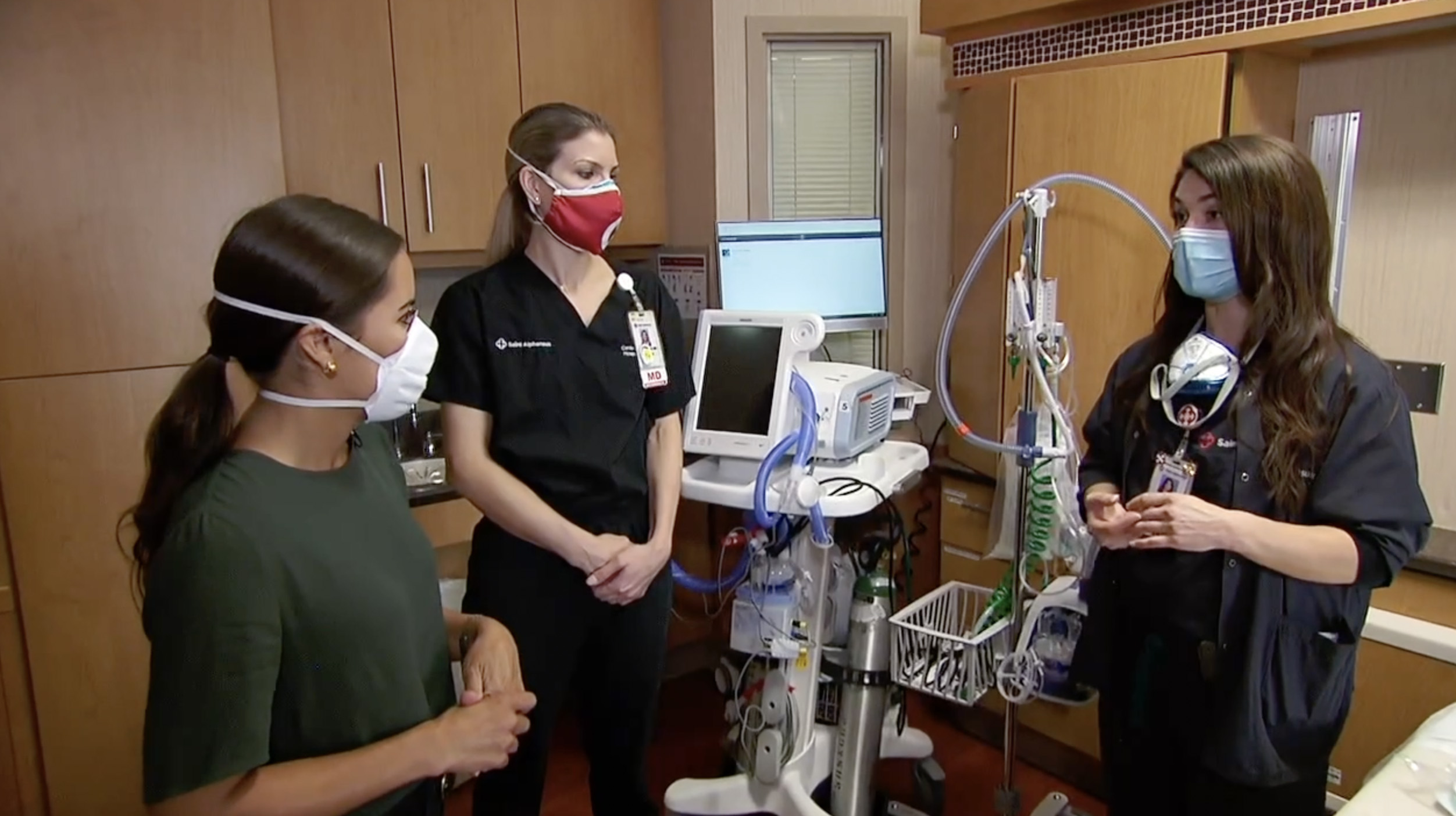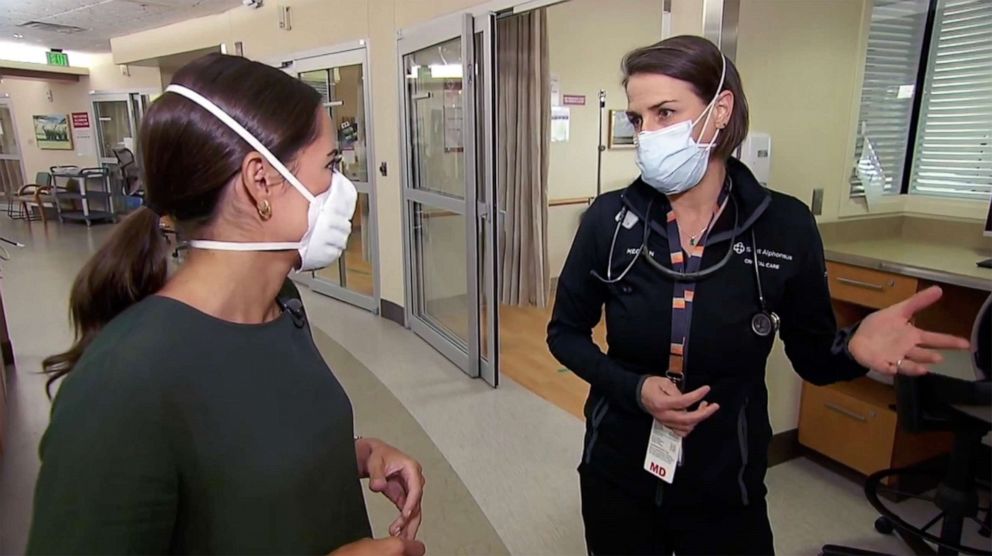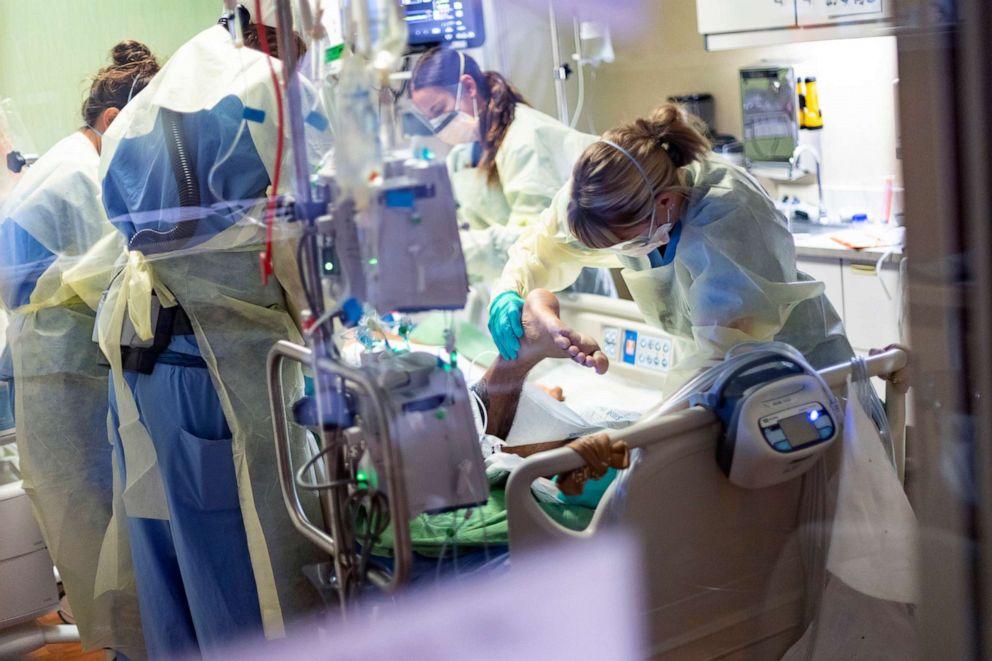Even on their death beds, some COVID-19 patients in Idaho still reject vaccination
In Idaho, a record 600 patients are now hospitalized with COVID-19.
Just a few months ago, there were only five COVID-19 patients, at Saint Alphonsus Regional Medical Center in Boise, Idaho. As of Thursday, there were more than 45.
Nearly all of these patients are not vaccinated, a reflection of "the amount of misinformation that's being absorbed, and taken as truth in our community because people are convinced that they don't want to be vaccinated, and then they end up here," Dr. Meghan McInerney, the intensive care unit's medical director, told ABC News.
Given the influx of patients, beds do not stay empty long.
"We are overwhelmed. We have so many patients with COVID, who are unvaccinated," said McInerney. "On top of an already busy ICU, you add the volume of COVID patients that we're seeing now and yes, it's just added a different level of busy, a different level of crazy. ... It's a lot. It's a lot."
Hospitals across the state of Idaho are now facing their most significant surge yet, as COVID-19 patients flood into emergency departments.
Statewide, more than 600 patients are now hospitalized with the virus, the highest on record, and less than 13% of the state's ICU beds remain available.

Earlier this week, in an effort to address the ongoing surge, state health officials in Idaho announced that they had activated a "crisis standards of care" for the state's northern hospitals, which will allow hospitals to ration care given the increased demand and a "severe staffing shortage."
The rapidly spreading delta variant has rendered the job of these front-line workers even more difficult, McInerney explained. Idaho currently has one of the lowest vaccination rates in the U.S., with less than 40% of the state's total population fully vaccinated; the national rate stands at 53.6%.
"It's really hard to be a physician at the front lines, doing this every single day and living in a state where the vaccination rate is so low," McInerney said.
In fact, all of the patients who are critically ill from COVID-19 and currently under care in Saint Alphonsus Boise have not been vaccinated, ICU nurse Jessica Parrott told ABC News, while "the people who are not getting critically ill, are the people who have the vaccine," she added.
The virus is also landing much younger people in the ICU, some of whom are in their early 20s. This particular wave of infections feels more "aggressive," than those treated during the surge in 2020, said Dr. Carolyn McFarlane, a hospitalist at Saint Alphonsus Boise.
"The deaths within our system in the past 24 hours are a 30-year-old and another in their 50s. It feels preventable," McFarlane said.

Staff are completely overworked and overwhelmed, McInerney said, and teams are facing a staffing crisis. Nurses are being increasingly asked to pick up extra shifts due to the influx of patients coming from all over Idaho, and even from outside the state.
"We don't have the hands that we need to take care of everyone. And it is incredibly frustrating for all of those involved on every level, between [administration] down to environmental services," said Alicia Luciani, a COVID-19 charge nurse at Saint Alphonsus Boise. "It's affecting everyone and affecting how our patients are getting care. And we do our utmost to provide all that we can for these patients." However, she added, "It's incredibly frustrating. Everyone is so tired."
In addition to the physical and emotional exhaustion from working shifts that feel like a "silent battleground," medical staffers at Saint Alphonsus said they are disheartened by the continued unwillingness of some Idaho residents to get the vaccine.
Although a number of patients do express regret that they have not received or sought out a vaccination, some even apologizing for it, according to nurse educator Monica Brower, others remain contentious, even after being on a ventilator and confronting the stark reality of their mortality.
"Don't tell me I have COVID. I don't believe in COVID," patients have told McFarlane, who teared up as she recounted combative patients.
"There is an almost adversarial tone to things when we ask, 'Did you get vaccinated?'" McFarlane said. "It creates a rift in the tone of the room, because it's a feeling of 'well you're going to treat me differently because I didn't get vaccinated,' and that is far from the truth."

In fact, said McFarlane, "It almost gets to a point where you read the tone in the room and you shy away from even asking about vaccination status, because you want to be able to focus on saving the person's life, not going into the politics behind the vaccine."
As more unvaccinated patients fill hospital beds, Luciani said it has become "really hard to maintain a level of hope."
"They stick to their guns," Luciani explained, and even on their death bed she's had to listen to people deny that they have the virus, while maintaining their fervent anti-vaccine sentiment. "In my mind, that life is essentially over as we know it. ... Some people just refuse. And it's kind of like a slap in the face."
"They don't get to see how hard we're working to try to keep them alive. ... This is the real deal. This is what it looks like," McInerney said.
When asked what keeps them going, McFarlane's answer resonates.
"We are taking care of our communities, family members, people that are acquaintances, neighbors. ... We will do everything we can to care for them, because we care, because we have taken an oath, and it's the time for us to rise to the occasion. And we are here for our community."




